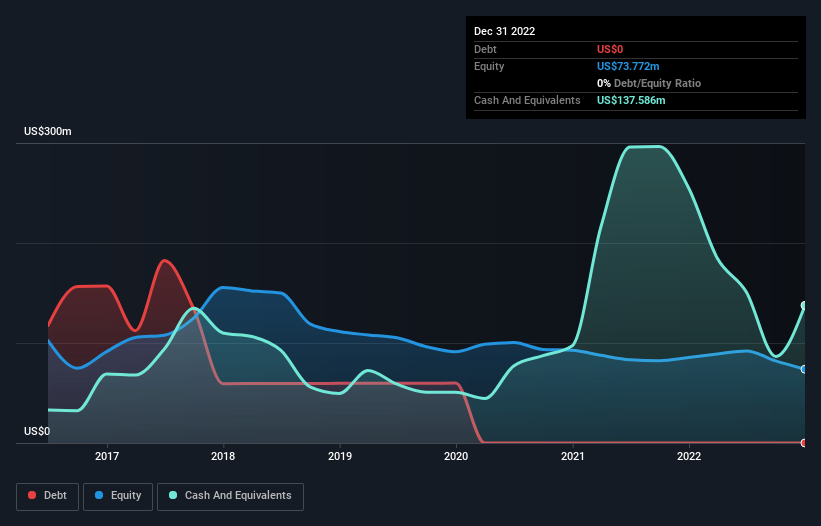Is Philly Shipyard (OB:PHLY) In A Good Position To Deliver On Growth Plans?

There's no doubt that money can be made by owning shares of unprofitable businesses. For example, although software-as-a-service business Salesforce.com lost money for years while it grew recurring revenue, if you held shares since 2005, you'd have done very well indeed. But while history lauds those rare successes, those that fail are often forgotten; who remembers Pets.com?
So should Philly Shipyard (OB:PHLY) shareholders be worried about its cash burn? In this article, we define cash burn as its annual (negative) free cash flow, which is the amount of money a company spends each year to fund its growth. We'll start by comparing its cash burn with its cash reserves in order to calculate its cash runway.
See our latest analysis for Philly Shipyard
Does Philly Shipyard Have A Long Cash Runway?
A company's cash runway is calculated by dividing its cash hoard by its cash burn. In December 2022, Philly Shipyard had US$138m in cash, and was debt-free. Looking at the last year, the company burnt through US$117m. Therefore, from December 2022 it had roughly 14 months of cash runway. While that cash runway isn't too concerning, sensible holders would be peering into the distance, and considering what happens if the company runs out of cash. You can see how its cash balance has changed over time in the image below.

Is Philly Shipyard's Revenue Growing?
Given that Philly Shipyard actually had positive free cash flow last year, before burning cash this year, we'll focus on its operating revenue to get a measure of the business trajectory. As it happens, shareholders have good reason to be optimistic about the future since the company increased its operating revenue by 83% over the last year. In reality, this article only makes a short study of the company's growth data. This graph of historic revenue growth shows how Philly Shipyard is building its business over time.
Can Philly Shipyard Raise More Cash Easily?
While Philly Shipyard's revenue growth truly does shine bright, it's important not to ignore the possibility that it might need more cash, at some point, even if only to optimise its growth plans. Companies can raise capital through either debt or equity. Many companies end up issuing new shares to fund future growth. We can compare a company's cash burn to its market capitalisation to get a sense for how many new shares a company would have to issue to fund one year's operations.
Philly Shipyard has a market capitalisation of US$44m and burnt through US$117m last year, which is 266% of the company's market value. Given just how high that expenditure is, relative to the company's market value, we think there's an elevated risk of funding distress, and we would be very nervous about holding the stock.
Is Philly Shipyard's Cash Burn A Worry?
On this analysis of Philly Shipyard's cash burn, we think its revenue growth was reassuring, while its cash burn relative to its market cap has us a bit worried. Summing up, we think the Philly Shipyard's cash burn is a risk, based on the factors we mentioned in this article. On another note, Philly Shipyard has 2 warning signs (and 1 which is a bit concerning) we think you should know about.
If you would prefer to check out another company with better fundamentals, then do not miss this free list of interesting companies, that have HIGH return on equity and low debt or this list of stocks which are all forecast to grow.
New: Manage All Your Stock Portfolios in One Place
We've created the ultimate portfolio companion for stock investors, and it's free.
• Connect an unlimited number of Portfolios and see your total in one currency
• Be alerted to new Warning Signs or Risks via email or mobile
• Track the Fair Value of your stocks
Have feedback on this article? Concerned about the content? Get in touch with us directly. Alternatively, email editorial-team (at) simplywallst.com.
This article by Simply Wall St is general in nature. We provide commentary based on historical data and analyst forecasts only using an unbiased methodology and our articles are not intended to be financial advice. It does not constitute a recommendation to buy or sell any stock, and does not take account of your objectives, or your financial situation. We aim to bring you long-term focused analysis driven by fundamental data. Note that our analysis may not factor in the latest price-sensitive company announcements or qualitative material. Simply Wall St has no position in any stocks mentioned.
About OB:PHLY
Philly Shipyard
Operates a commercial shipyard that builds and repairs vessels for the United States Jones Act market and government.
Flawless balance sheet slight.
Market Insights
Community Narratives




